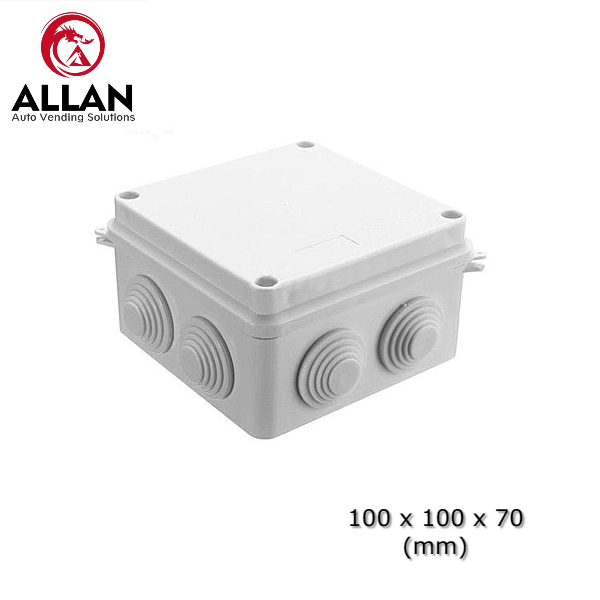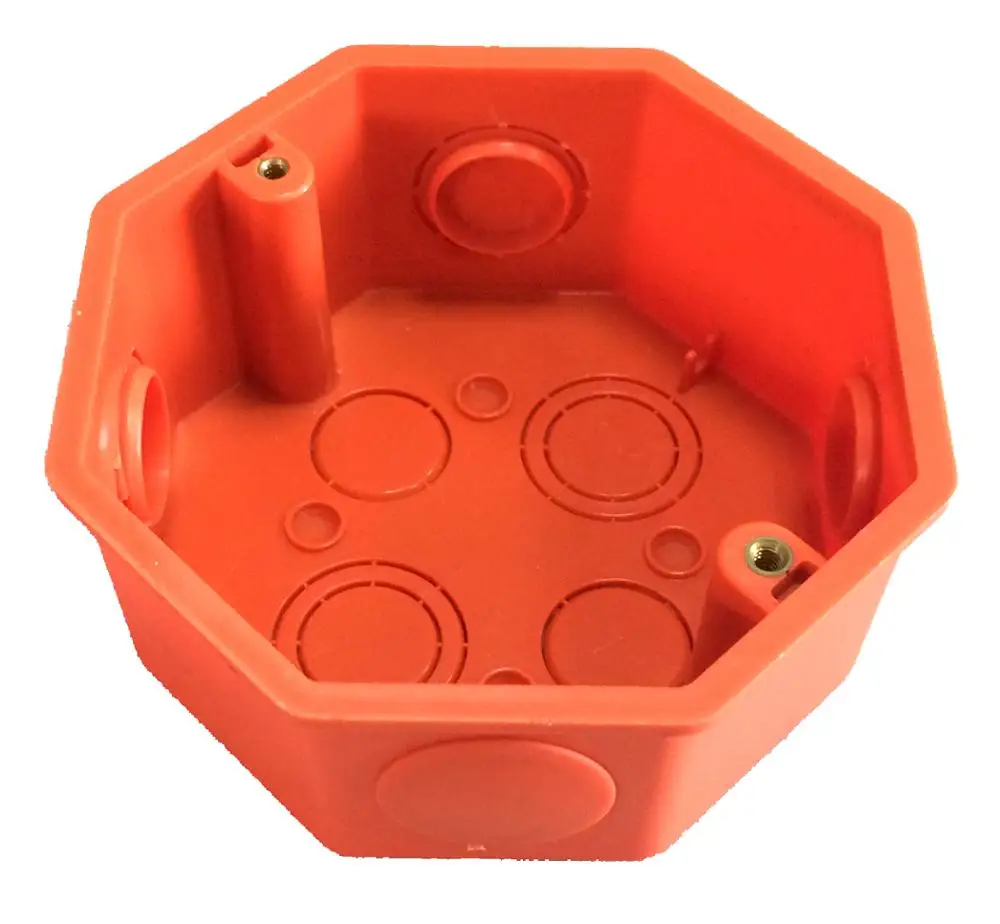Amazing Tips About Can I Use A Plastic Box As Junction

ABS Waterproof Junction Boxes, IP68 At Rs 250/piece In Vadodara ID
Decoding the Plastic Box Dilemma
1. Understanding Junction Box Basics
Okay, so you're staring at a pile of electrical wires and a shiny plastic box, and the question pops: "Can I use this as a junction box?" It's a valid question! Junction boxes are those unassuming enclosures that protect electrical connections, keeping everything safe and code-compliant. Think of them as tiny fortresses for your wires. They're critical for preventing fires and shocks. You really don't want to skimp here.
The main function of a junction box is to provide a secure and fire-resistant enclosure for wire splices. It's basically a safeguard against exposed wires, which can be incredibly dangerous. Imagine a loose wire sparking against flammable material — not a pretty picture. They also make it easier to access connections later for maintenance or repairs. After all, nobody wants to rip open a wall just to fix a simple wiring issue.
Now, these boxes arent just randomly chosen. They must meet specific safety standards and regulations, like being made of fire-resistant materials and having enough space for the wires inside. Code compliance is KEY. Think of it as the electrician's bible. If you're unsure, always consult with a qualified electrician. It's better to be safe (and compliant) than sorry!
So, before you reach for that plastic container you found in the garage, let's dig deeper into the crucial differences between regular plastic boxes and those specifically designed for electrical work.
2. The Plastic Box Breakdown
Here's the thing: not all plastic is created equal, especially when it comes to electricity. That Tupperware container might be great for leftovers, but it's a terrible choice for housing electrical connections. Why? Because standard plastic isn't fire-resistant and doesn't meet the safety standards required for junction boxes.
Electrical junction boxes, on the other hand, are typically made from materials like PVC (polyvinyl chloride) or metal. PVC is a type of plastic that's specifically formulated to be flame-retardant. Metal boxes, often made of steel or aluminum, are even more robust and can withstand higher temperatures. This difference in material is crucial.
Imagine a scenario where a wire overheats inside a regular plastic box. The plastic could melt, potentially causing a fire or electrical shock. A proper junction box is designed to contain the heat and prevent the fire from spreading. So, while that plastic box might look like it could work, it's a serious safety hazard waiting to happen.
Think of it like this: you wouldn't use a paper plate to hold a boiling pot of soup, right? Same principle applies here. Use the right tool for the right job, and when it comes to electricity, safety should always be your top priority.
3. Decoding the Jargon
You'll often see the term "UL Listed" when shopping for electrical components. What does it mean? It means that the product has been tested and certified by Underwriters Laboratories (UL), a well-respected safety organization. This certification indicates that the product meets specific safety standards and is suitable for its intended use.
A UL Listed junction box has undergone rigorous testing to ensure it can withstand heat, resist fire, and provide adequate protection for electrical connections. It's essentially a stamp of approval that gives you peace of mind knowing the product is safe and reliable. Always look for the UL Listed mark when purchasing electrical components, including junction boxes.
Using a non-UL Listed box is a gamble. You're essentially trusting an uncertified product to protect your home and family from electrical hazards. Is it really worth the risk? Spending a few extra dollars on a UL Listed junction box is a small price to pay for safety and peace of mind.
So, when you're browsing the aisles of your local hardware store, pay attention to those little UL Listed logos. They're there for a reason, and they can make a big difference in the safety of your electrical installations.
4. The Code of Conduct
Electrical codes, like the National Electrical Code (NEC) in the United States, are sets of regulations that govern the safe installation of electrical systems. These codes specify the types of materials that can be used, the wiring methods that are allowed, and the requirements for junction boxes, among other things. Ignoring these codes can lead to fines, insurance problems, and, most importantly, safety hazards.
The NEC, for example, specifies that junction boxes must be accessible, meaning they can't be buried behind walls or ceilings without access panels. This allows for easy inspection and maintenance of the electrical connections. It also dictates the size and type of junction box required based on the number and size of the wires being connected.
Local building codes often incorporate or amend the NEC, so it's essential to check with your local authorities to ensure your electrical installations comply with all applicable regulations. Failing to comply with these codes can have serious consequences, including potential liability in case of a fire or electrical accident.
Think of electrical codes as the rules of the road for electrical work. They're there to protect you, your property, and everyone else who might come into contact with your electrical system. When in doubt, consult with a qualified electrician who is familiar with the local codes and can ensure your installations are safe and compliant.
5. Plastic Box Alternatives
So, if your standard plastic box isn't suitable for use as a junction box, what are your options? Thankfully, there are plenty of safe and code-compliant alternatives available. As mentioned earlier, PVC junction boxes are a great choice. They're inexpensive, durable, and flame-retardant. They come in various sizes and shapes to accommodate different wiring configurations.
Metal junction boxes are another excellent option, especially for heavy-duty applications or where extra protection is needed. They're more resistant to impact and can withstand higher temperatures than PVC boxes. Metal boxes are often used in commercial and industrial settings, but they're also suitable for residential applications.
When choosing a junction box, consider the environment where it will be installed. If it's in a damp or wet location, you'll need a weatherproof or waterproof box to protect the electrical connections from moisture. These boxes have special gaskets and seals to prevent water from entering.
Remember to always choose a junction box that's appropriately sized for the number of wires you'll be connecting. Overcrowding wires in a junction box can lead to overheating and potentially create a fire hazard. It's always better to err on the side of caution and choose a slightly larger box than you think you need.

Pvc Junction Box
FAQ
6. Can I use a plastic box as a junction box if it's hidden behind drywall?
Absolutely not! Electrical codes require junction boxes to be accessible. Burying a junction box behind drywall without an access panel is a big no-no. You need to be able to easily access it for maintenance and repairs.
7. What happens if I use the wrong type of junction box?
Using the wrong type of junction box can lead to a variety of problems, including electrical fires, shocks, and code violations. It's crucial to use a junction box that's specifically designed for electrical applications and meets all applicable safety standards. Don't risk it!
8. Is it okay to paint a plastic junction box?
Generally, it's best to avoid painting plastic junction boxes. Paint can sometimes interfere with the box's ability to dissipate heat, and it can also make it difficult to read any labeling or markings on the box. If you must paint it, use a paint that's specifically designed for plastic and won't affect its fire-resistant properties.
9. Where can I buy approved junction boxes?
You can find approved junction boxes at most hardware stores, home improvement centers, and electrical supply stores. Just make sure to look for the UL Listed mark to ensure you're getting a safe and code-compliant product. Happy wiring!

ALLAN Fiber Junction Box Plastic ABS Enclosure IP68 Connection

What Is A Junction Box? EAbel

